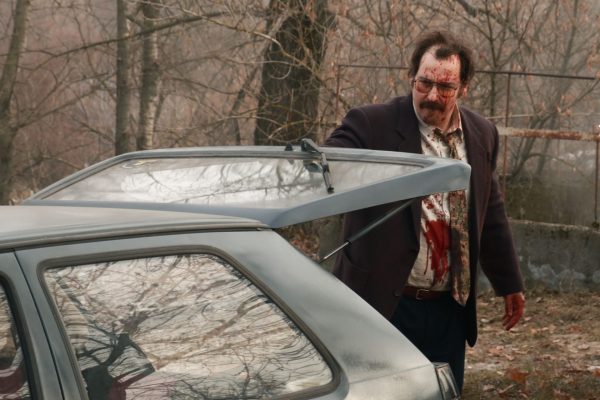The collapse of Communism was perhaps the most seismic political event of the late 20th century, with the tearing down of the Berlin Wall its most potent symbol. But change is not easy, nor instant, no matter if the ‘good guys’ are victorious. National boundaries can be far more arbitrary and fluid than the attitudes and allegiances that are left wallowing in supposed obsolescence. Christian Alvert’s bleak detective drama Free Country (a remake of the Spanish post-Franco drama Marshland) is stretched taut like a piano wire between Western and Eastern ideologies that remained entrenched despite the erasure of the physical demarcation. However, Alvert is so enamoured with his pointillist period context the central mystery becomes of secondary importance.
Two teenage sisters go missing from their small town near the Polish border in 1992, and two mismatched detectives are assigned to investigate. Patrick Stein (Trystan Pütter) is shipped out from Hamburg as punishment for busting his boss’ brother on a drugs charge. Markus Bach (Felix Kramer) is a remnant of the GDR who may have a murky Stasi-related past. They instantly fit into the familiar good cop/ bad cop dichotomy, which makes barely a dent on the stony defences of the town’s residents. Even the parents of the girls seem reticent to help, suggesting something far more sinister than a pair of free-spirited teens running away in search of fruit that had previously been forbidden.
Free Country is the most abstract of detective thrillers. Alvart’s film is more concerned with evoking a sense of time and place than in establishing the propulsive rhythms of a police procedural, and it does this extremely well. The benefits of democracy are slow to trickle into the newly re-established region of Mecklenberg-Vorpommern, even three years after the collapse of the Wall, and the remote town from where the girls have vanished looks like it has been left to rot. The overhead shots of its tree-lined country roads look like wind rippling through the pelt of a dead animal. The heads of industry have been taking on Polish labourers who will work for a third of the wage of local workers, and rusty fishing vessels fly the flag of united Germany almost ironically.
The central relationship between the two protagonists is bluntly symbolic of the clashing cultures. Stein is studious and by-the-book, resentful of being sent out to a backwater while his pregnant wife nears her due date back home. Bach is a burly bulldozer of a man, big of belly and moustache. As a character, he nestles in some Teutonic hinterland between Tosh Lines and Andy Sipowicz. Stein drives a Mercedes and Bach, a Lada. It isn’t the most subtle of political metaphors but gets plenty of mileage from their antagonism in a way that grounds the narrative enough so the diaphanous plot doesn’t vanish into the ether like the missing sisters. The East and West sparring works as the central hook in the same way as the various iterations of the malleable Danish and Swedish drama The Bridge. The Nordic Noir comparison extends as far as Alvart’s adoption of the glum, desaturated colour scheme, and bleakly Calvinist aesthetic that tends to characterise those shows.
At over two hours, Free Country‘s lack of procedural momentum works against it, with what narrative drive it does have so entrenched in the political backdrop that the destination becomes fairly obvious. As such, it’s occasionally a weary journey with only the meaty performances – particularly Kramer as the hard-drinking, blood-pissing Bach – and the fascinating political backdrop and acutely specific location to latch on to. Think Twin Peaks with the surreal humour stripped out and internecine industrial disputes added and you’re there.
Besides the central duo, Free Country suffers from thin characterisation – like a ghoulish journalist and a comically sinister police chief – but has that wonderful ambiguous atmosphere which covers many sins. Its political ambivalence sees the new capitalism roll in with new ways to exploit vulnerable people, but also has a character grumble they were on a 15-year waiting list for a Trabant under the old system. It’s perhaps a tortuous way of saying plus ça change plus c’est la même chose, but there’s more than enough to like in Free Country – especially for those with a real interest in the minutiae of post-reunification Germany politics – to make up for its overly familiar elements and some uninspired storytelling.
Available on-demand as part of Fantasia Festival from Thu 20 Aug 2020
